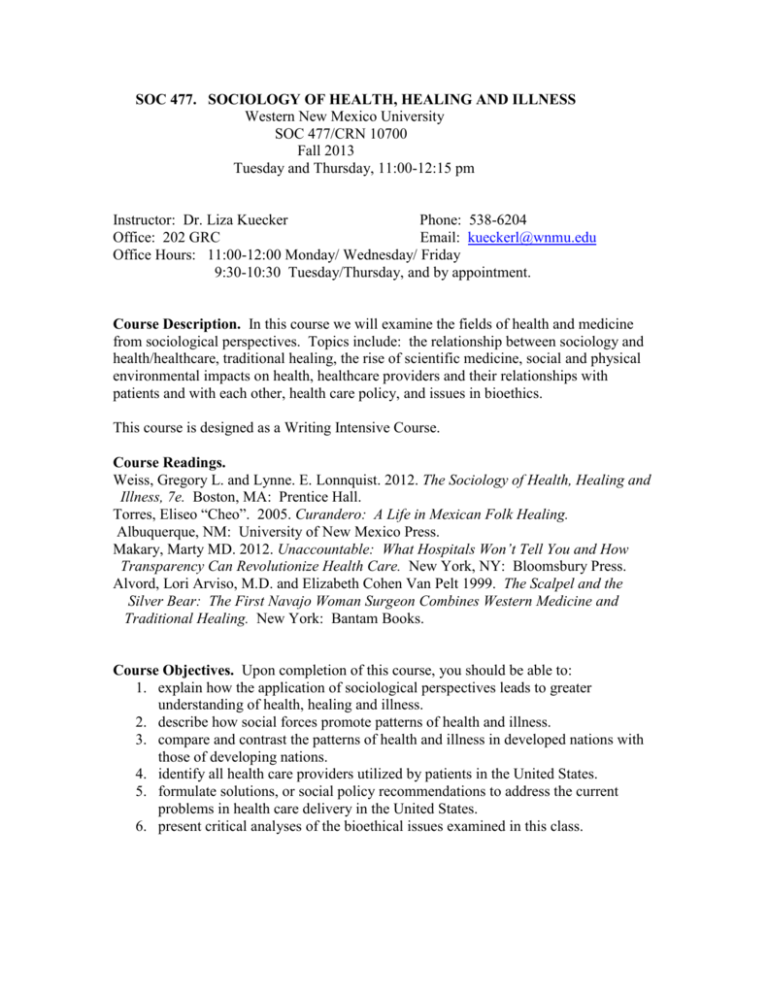Imagine walking into a doctor’s office, feeling anxious and overwhelmed. You’re not sure what’s wrong, but you know something isn’t right. The doctor asks you questions, observes your symptoms, and ultimately prescribes medication. You leave feeling relieved, confident that the medication will fix you. But what if the doctor’s diagnosis, and your own understanding of your illness, were also shaped by your social context? This is where the sociology of health, healing, and illness comes into play, challenging us to think beyond the individual body and consider the broader social forces that influence our health and well-being.

Image: studylib.net
The sociology of health, healing, and illness is a fascinating field that examines how social factors – including class, race, gender, culture, and socioeconomic status – impact our understanding of and experiences with health, illness, and healing. It delves into the social construction of health and illness, exploring how these concepts are defined, interpreted, and managed within different social groups and contexts. By understanding these social dimensions, we can gain a deeper and more nuanced understanding of health and illness, paving the way for more equitable health outcomes for all.
Exploring the Social Construction of Health and Illness
The first step in understanding the sociology of health, healing, and illness is recognizing that health and illness are not merely biological states. They are also social constructs, meaning that they are defined and shaped by social, cultural, and historical factors. What is considered healthy or unhealthy in one society may be different in another, and these definitions can change over time.
For example, consider the evolution of our understanding of obesity. While once considered a sign of wealth and prosperity, obesity is now widely viewed as a health risk. This shift reflects changing social norms and values, as well as the influence of the medical profession in defining and interpreting health. This highlights how societal values and beliefs can shape our perceptions of what constitutes health and illness, impacting our behaviors and health outcomes.
The Influence of Social Determinants of Health
The sociology of health, healing, and illness also investigates the social determinants of health, which are the social and environmental factors that influence health and well-being. These include:
- Socioeconomic Status: Individuals with lower socioeconomic status often experience worse health outcomes due to factors like limited access to healthcare, unhealthy living environments, and stress from financial instability.
- Race and Ethnicity: Racial and ethnic disparities in health are well documented, with certain groups facing higher rates of chronic diseases and premature death. This can be attributed to systemic racism, discrimination, and unequal access to healthcare resources.
- Gender: Gender plays a significant role in health experiences, with women generally living longer than men but facing higher rates of certain illnesses. Social norms and expectations can also impact health behaviors and access to care.
- Culture: Cultural beliefs and practices influence health behaviors, perceptions of illness, and the use of healthcare services. This can lead to variations in health outcomes across different cultural groups.
- Education: Higher levels of education are associated with better health outcomes, likely due to increased awareness of health risks, better access to information, and improved decision-making about health behaviors.
These factors interact in complex ways to shape individual and community health, highlighting the importance of considering social contexts when addressing health issues. For example, understanding the relationship between socioeconomic status and health disparities can help develop targeted interventions to improve access to healthcare and address root causes of inequality.
The Social Construction of Healing and Medicalization
The sociology of health, healing, and illness extends beyond understanding the social determinants of health and explores the social construction of healing itself. The medicalization of health and illness is a key concept in this area, referring to the tendency to define and treat a growing range of human experiences as medical problems.
This can have both positive and negative consequences. On the one hand, medicalization can lead to new treatments and interventions for conditions that were previously neglected. For example, the recognition of mental health as a medical issue has led to greater awareness and access to treatment. On the other hand, medicalization can also contribute to over-diagnosis and over-treatment, leading to unnecessary medical interventions and potentially harmful side effects.
The social construction of healing also encompasses alternative and complementary medicine practices, such as acupuncture, yoga, and herbal remedies. These practices often challenge the dominant biomedical model and emphasize holistic approaches that address physical, mental, and emotional well-being. Understanding the social and cultural contexts that give rise to these practices can help us appreciate the diverse ways in which people seek healing and well-being.

Image: testallbank.com
Latest Trends and Developments in the Sociology of Health, Healing, and Illness:
The field of sociology of health, healing, and illness is constantly evolving, responding to new challenges and opportunities in health care. Some key trends include:
- The Growing Importance of Social Networks in Health: Research increasingly emphasizes the role of social connections in health outcomes. Strong social support networks can buffer individuals from stress and promote healthier behaviors, while social isolation is linked to poorer health.
- The Role of Technology in Health and Illness: Digital technologies are transforming healthcare, offering new opportunities for communication, monitoring, and access to information. The sociology of health is examining how these technologies impact health behaviors, access to care, and the doctor-patient relationship.
- The Rise of Health Inequalities: Health inequalities are widening, with disparities based on race, socioeconomic status, and other social factors. Sociologists are studying the root causes of these disparities and working to develop solutions to achieve health equity.
- The Importance of Holistic Approaches to Health: There is growing recognition that a holistic approach to health is crucial, considering not only physical well-being but also mental, emotional, and social aspects. This approach aligns with the increasing popularity of alternative and complementary medicine practices.
Tips and Expert Advice for Enhancing Health and Well-Being:
Understanding the social dimensions of health, healing, and illness can empower you to take control of your own well-being. Here are some tips based on insights from the sociology of health:
- Be Aware of Social Determinants of Health: Recognize how factors like socioeconomic status, race, gender, and culture can influence your health and seek support to address any barriers to accessing healthcare or healthy living conditions.
- Develop Strong Social Connections: Cultivate meaningful relationships with family, friends, and community members. Social support is essential for mental and emotional well-being and can contribute to healthier behaviors.
- Engage in Healthy Lifestyle Practices: Adopt a balanced diet, regular exercise, and stress-management techniques. These practices can enhance your physical and mental health and contribute to overall well-being.
- Seek Information and Knowledge: Stay informed about health risks and protective factors specific to your demographic group and social context. This knowledge can empower you to make informed decisions about your health.
- Advocate for Health Equity: Speak out against health disparities and support initiatives that promote equity in access to healthcare and healthy living conditions for all.
By understanding the interplay between social factors and health, and by taking proactive steps to improve your health and well-being, you can contribute to a more just and equitable society, one that prioritizes the health and well-being of all individuals.
FAQ about The Sociology of Health, Healing, and Illness
What is the difference between health and illness?
In a purely biological sense, health is considered the normal functioning of the body, while illness refers to a deviation from that normal functioning. However, the sociology of health recognizes that these concepts are also socially constructed, meaning that they are influenced by cultural, historical, and social factors. What is considered healthy or unhealthy can vary across different societies and cultures, and these definitions can change over time.
What are some examples of health inequalities?
Health inequalities refer to the disparities in health outcomes between different social groups. Some examples include:
- Racial disparities in maternal mortality: Black women in the United States are significantly more likely to die from pregnancy-related complications than white women. This disparity is linked to systemic racism and unequal access to healthcare.
- Socioeconomic disparities in chronic disease: Individuals with lower socioeconomic status are more likely to experience chronic diseases like heart disease, diabetes, and obesity. This can be attributed to factors like poverty, limited access to healthy food, and stressful living conditions.
- Gender disparities in mental health: Women are disproportionately affected by mental health conditions like depression and anxiety. This can be linked to societal pressures, gender roles, and the stigma surrounding mental illness.
How can I learn more about the sociology of health?
There are many resources available to learn more about the sociology of health, healing, and illness. Some suggestions include:
- Reading books and articles: Explore academic journals, textbooks, and popular articles on the subject.
- Taking a course: Many universities offer courses in sociology of health or related topics.
- Attending conferences and workshops: Engage with researchers and practitioners in the field by attending conferences and workshops.
- Joining online communities: Connect with other individuals interested in sociology of health and participate in discussions and forums.
The Sociology Of Health Healing And Illness
Conclusion
The sociology of health, healing, and illness offers a critical lens for understanding the complex and interconnected nature of health and well-being. By recognizing the social determinants of health, examining the social construction of health and illness, and exploring the diverse ways in which people seek healing, we can contribute to a more equitable and just society where everyone has the opportunity to thrive.
Are you interested in learning more about the sociology of health, healing, and illness? Share your thoughts and experiences in the comments below, and let’s continue this conversation about the social dimensions of well-being.



/GettyImages-173599369-58ad68f83df78c345b829dfc.jpg?w=740&resize=740,414&ssl=1)


